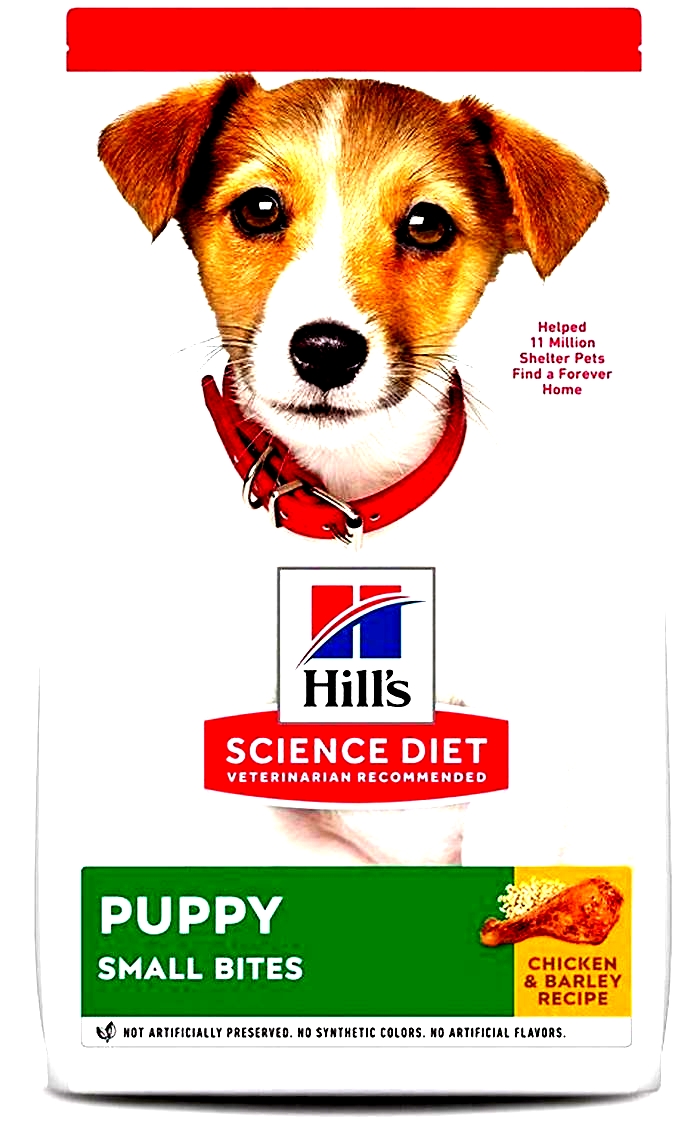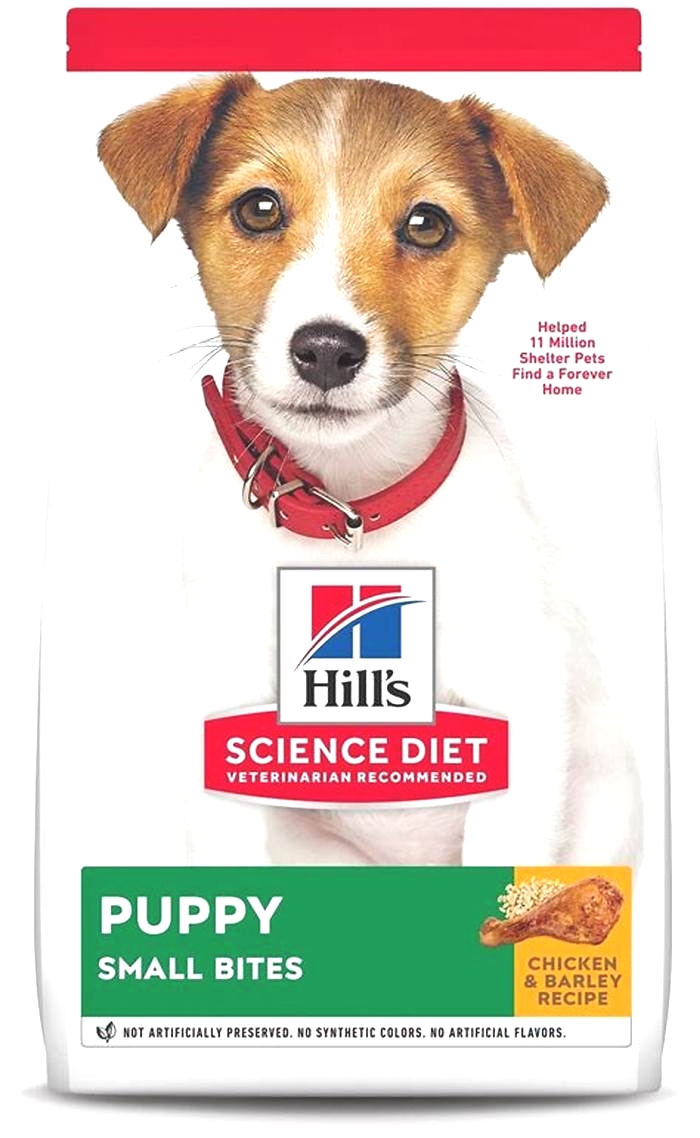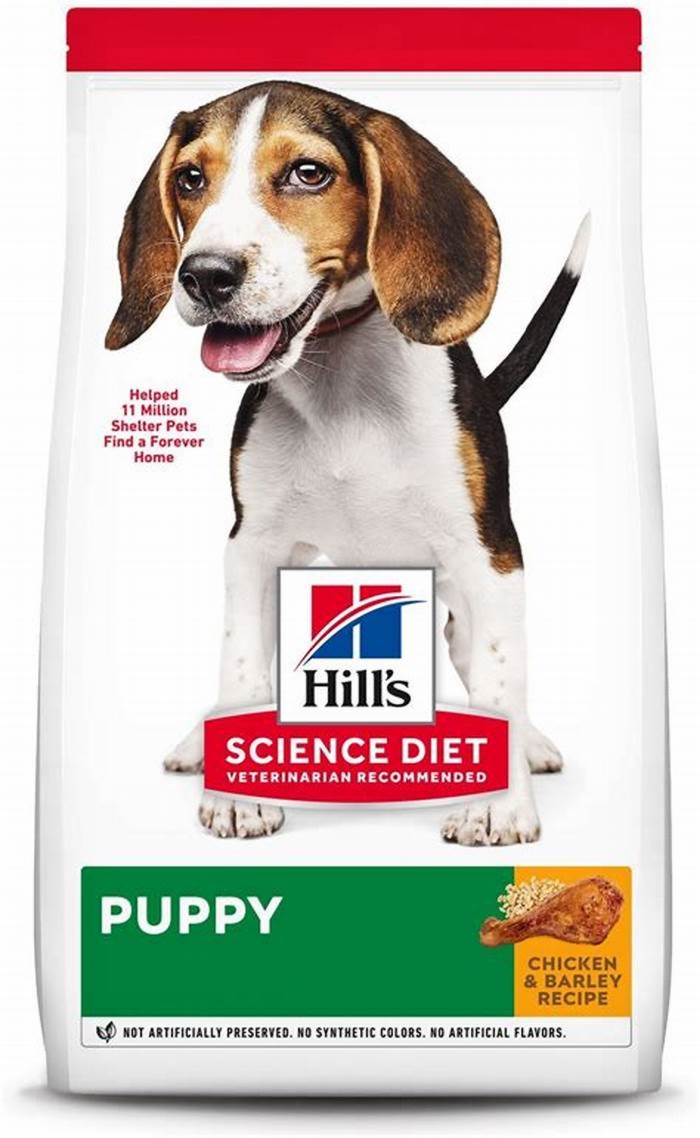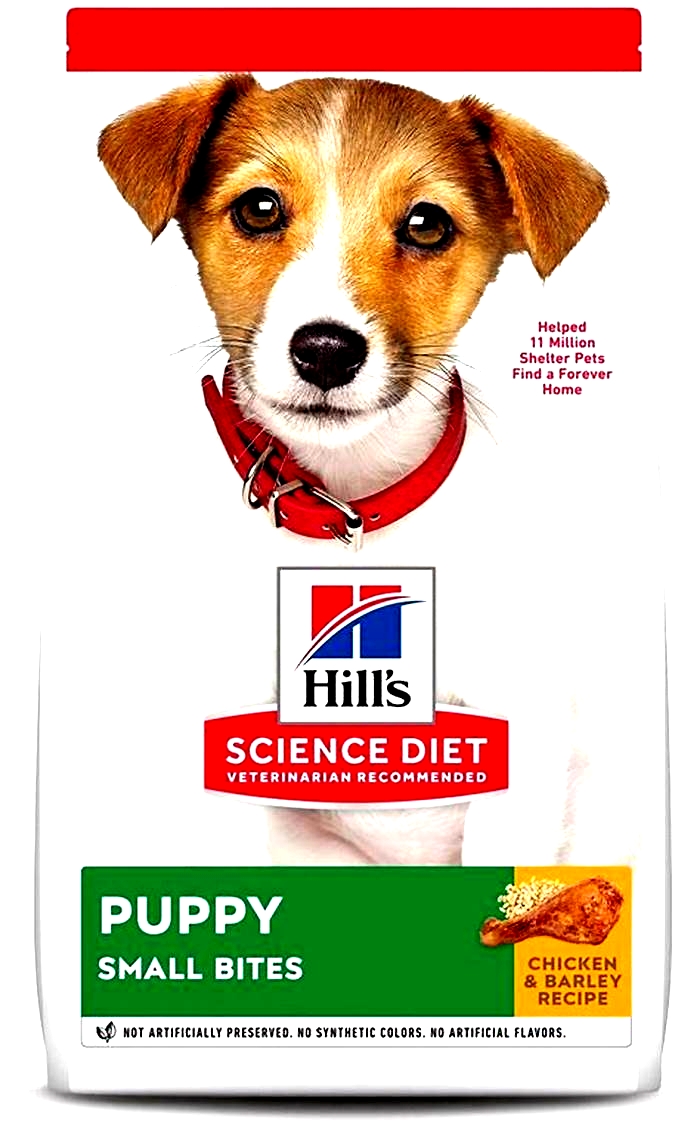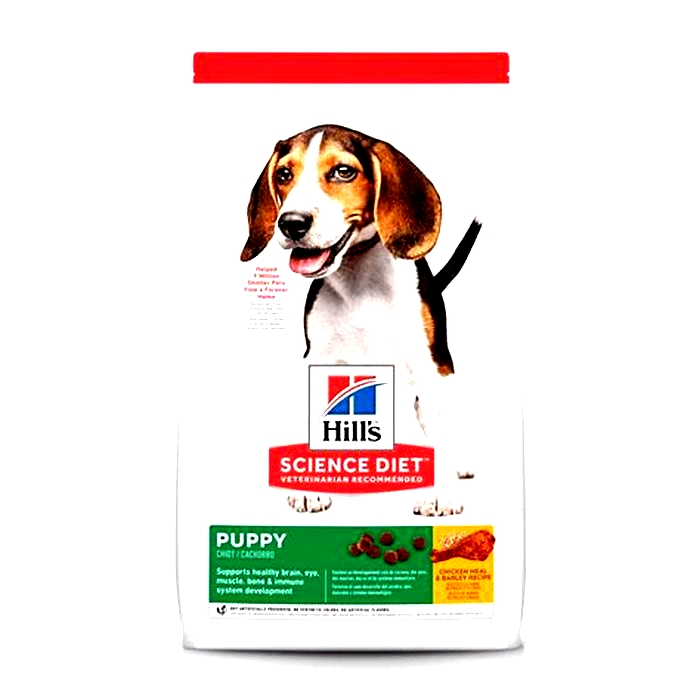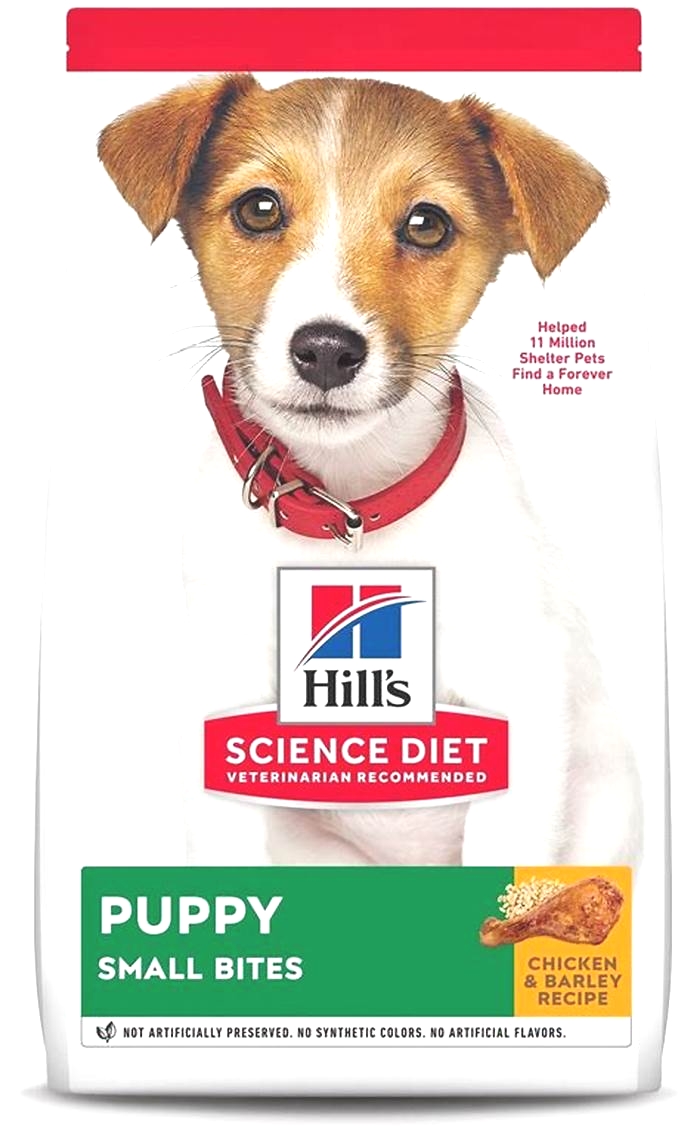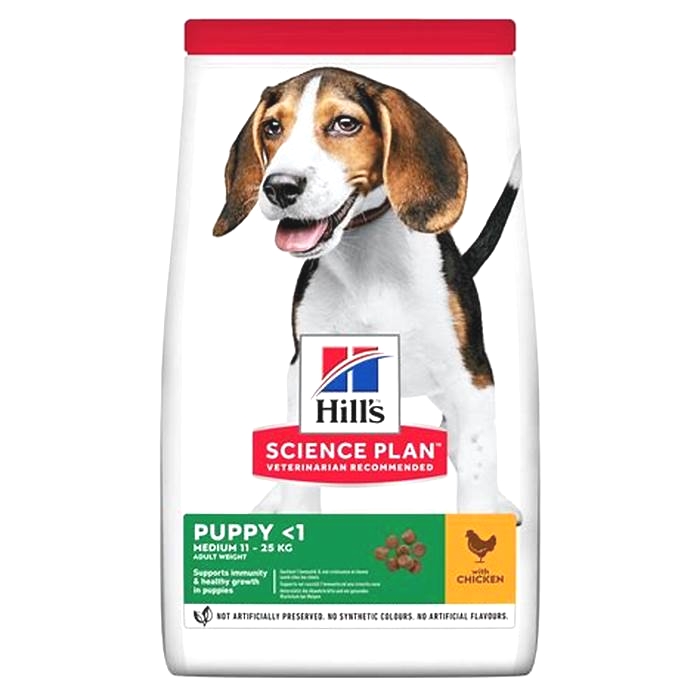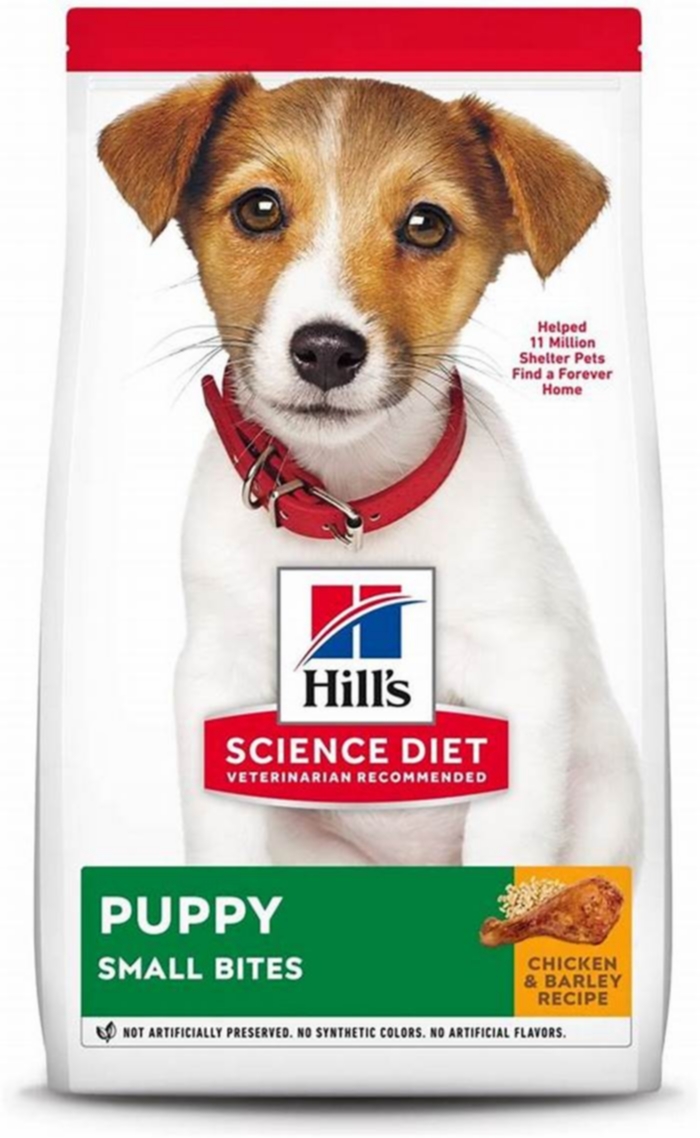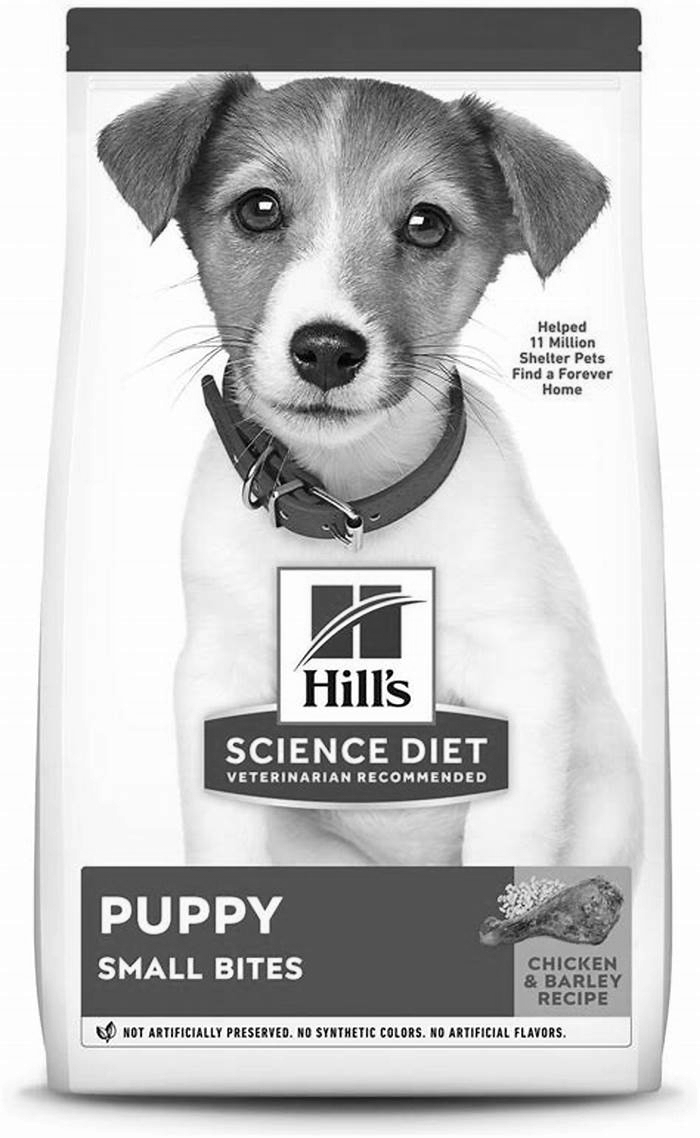Maximizing Puppy Growth and Development with Science Diet
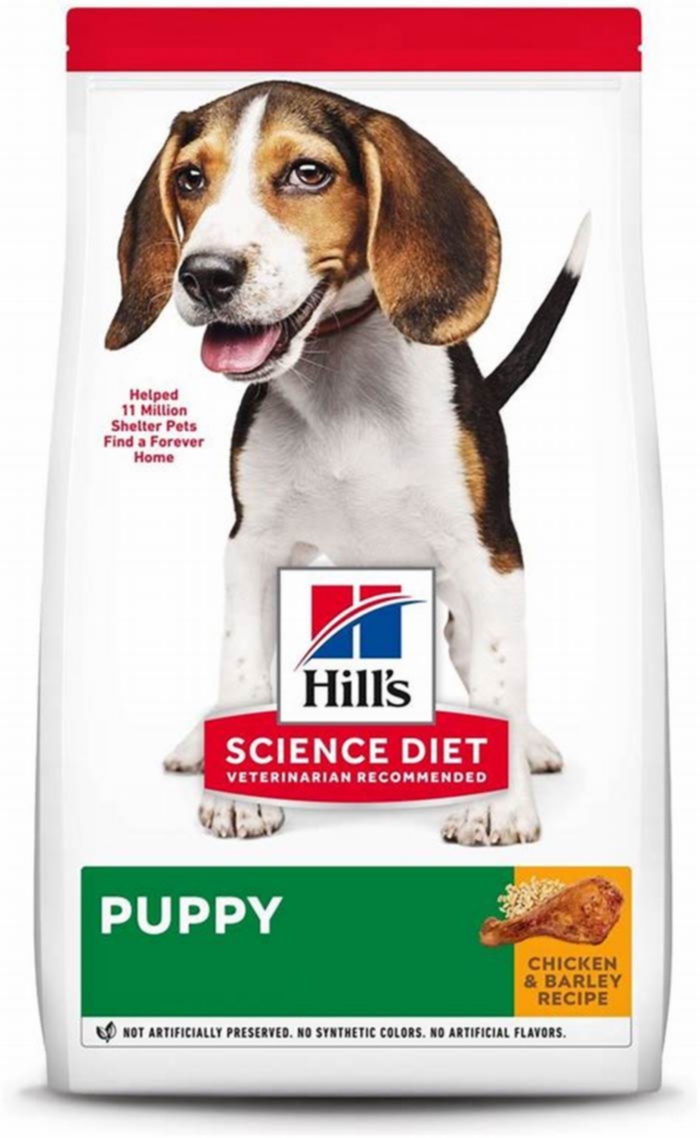
Hill's Science Diet Puppy Small Bites Chicken & Barley Recipe Dog Food
INGREDIENTS:Chicken Meal, Whole Grain Wheat, Cracked Pearled Barley, Whole Grain Sorghum, Whole Grain Corn, Chicken Fat, Corn Gluten Meal, Chicken Liver Flavor, Dried Beet Pulp, Pork Liver Flavor, Fish Oil, Flaxseed, Lactic Acid, Soybean Oil, Dicalcium Phosphate, Iodized Salt, Potassium Chloride, Choline Chloride, vitamins (Vitamin E Supplement, L-Ascorbyl-2-Polyphosphate (source of Vitamin C), Niacin Supplement, Thiamine Mononitrate, Vitamin A Supplement, Calcium Pantothenate, Riboflavin Supplement, Biotin, Vitamin B12 Supplement, Pyridoxine Hydrochloride, Folic Acid, Vitamin D3 Supplement), minerals (Ferrous Sulfate, Zinc Oxide, Copper Sulfate, Manganous Oxide, Calcium Iodate, Sodium Selenite), Taurine, Oat Fiber, Mixed Tocopherols for freshness, Natural Flavors, Beta-Carotene, Apples, Broccoli, Carrots, Cranberries, Green Peas.
Hill's Science Diet Puppy Large Breed
INGREDIENTS:Chicken Meal, Whole Grain Wheat, Whole Grain Oats, Whole Grain Sorghum, Corn Gluten Meal, Chicken Fat, Whole Grain Corn, Chicken Liver Flavor, Flaxseed, Dried Beet Pulp, Pork Liver Flavor, Fish Oil, Lactic Acid, Iodized Salt, Dicalcium Phosphate, Potassium Chloride, vitamins (Vitamin E Supplement, L-Ascorbyl-2-Polyphosphate (source of Vitamin C), Niacin Supplement, Thiamine Mononitrate, Vitamin A Supplement, Calcium Pantothenate, Riboflavin Supplement, Biotin, Vitamin B12 Supplement, Pyridoxine Hydrochloride, Folic Acid, Vitamin D3 Supplement), Choline Chloride, minerals (Ferrous Sulfate, Zinc Oxide, Copper Sulfate, Manganous Oxide, Calcium Iodate, Sodium Selenite), Taurine, Oat Fiber, L-Carnitine, Mixed Tocopherols for freshness, Natural Flavors, Beta-Carotene, Apples, Broccoli, Carrots, Cranberries, Green Peas.
Hill's Puppy Food: Quality Ingredients for Health & Nutrition
All Hill's pet foods combine exceptional health benefits with excellent value at just pennies more per day than grocery brands and come with a 100% satisfaction guarantee that your pet will love the taste.
Hill's puppy foods
Hill's puppy foods provide complete and balanced nutrition for growing puppies. Depending on the specific needs of your pet, your veterinarian can recommend which Hill's Science Diet puppy food is best for your new puppy.
All Hill's puppy foods contain:
- A powerful combination of antioxidants to promote a healthy immune system*
- Natural DHA to promote better brain and vision development*
- Fatty acids to support healthy function of the nervous and immune systems, and promote healthy skin and a shiny coat
- Highly digestible carbohydrates to supply abundant energy for lively puppies
- All the essential vitamins and minerals needed to provide a complete balance for growth
- A great taste your puppy will love
- Natural preservatives
*Dry formulas only
DHA and why it's important
DHA (docosahexaenoic acid) is an omega-3 fatty acid found naturally in the breast milk of dogs. As a major building block of the brain, DHA is critical for vision and central nervous system development. Foods enhanced with DHA, like Hill's puppy foods, help puppies reach their potential for body and brain development.
Hill's Science Diet Puppy Healthy Development
- Optimal levels of DHA from high quality fish oil for healthy brain and eye development.
- Clinically proven antioxidants for a healthier immune system.
- Precisely balanced nutrition, proven to ensure ideal body weight.
After feeding your puppy specially formulated Hill's puppy foods for his first year, you can now choose from a wide variety of Science Diet pet foods and Prescription Diet pet foods for a complete line of great-tasting nutrition for your pet based on age, activity level and special needs.
Puppy Large Breed Chicken & Brown Rice Recipe
INGREDIENTS:Chicken, Brown Rice, Whole Grain Oats, Chicken Meal, Cracked Pearled Barley, Chicken Fat, Pea Protein, Brewers Rice, Whole Grain Wheat, Soybean Meal, Whole Grain Corn, Chicken Liver Flavor, Ground Pecan Shells, Lactic Acid, Pork Liver Flavor, Dicalcium Phosphate, Flaxseed, Dried Beet Pulp, Fish Oil, Iodized Salt, Dried Citrus Pulp, Potassium Chloride, Choline Chloride, Pressed Cranberries, Calcium Carbonate, vitamins (Vitamin E Supplement, L-Ascorbyl-2-Polyphosphate (source of Vitamin C), Niacin Supplement, Thiamine Mononitrate, Vitamin A Supplement, Calcium Pantothenate, Riboflavin Supplement, Biotin, Vitamin B12 Supplement, Pyridoxine Hydrochloride, Folic Acid, Vitamin D3 Supplement), DL-Methionine, L-Threonine, Taurine, minerals (Ferrous Sulfate, Zinc Oxide, Copper Sulfate, Manganous Oxide, Calcium Iodate, Sodium Selenite), L-Tryptophan, Mixed Tocopherols for freshness, Natural Flavors, L-Carnitine, Beta-Carotene.
Puppy Chicken & Brown Rice Recipe
INGREDIENTS:Chicken, Brown Rice, Whole Grain Wheat, Chicken Meal, Chicken Fat, Whole Grain Corn, Whole Grain Oats, Pea Protein, Soybean Meal, Hydrolyzed Chicken Flavor, Ground Pecan Shells, Dicalcium Phosphate, Lactic Acid, Pork Liver Flavor, Soybean Oil, Iodized Salt, Flaxseed, Dried Beet Pulp, Dried Citrus Pulp, Potassium Chloride, Fish Oil, Choline Chloride, Pressed Cranberries, vitamins (Vitamin E Supplement, L-Ascorbyl-2-Polyphosphate (source of Vitamin C), Niacin Supplement, Thiamine Mononitrate, Vitamin A Supplement, Calcium Pantothenate, Riboflavin Supplement, Biotin, Vitamin B12 Supplement, Pyridoxine Hydrochloride, Folic Acid, Vitamin D3 Supplement), L-Threonine, DL-Methionine, minerals (Ferrous Sulfate, Zinc Oxide, Copper Sulfate, Manganous Oxide, Calcium Iodate, Sodium Selenite), Taurine, Mixed Tocopherols for freshness, Natural Flavors, L-Tryptophan, Beta-Carotene.
Introduction: The Impact of Size on Puppy Health and Well-being
Size matters when it comes to puppies! These adorable balls of fur have unique needs that vary based on their size. In this blog post, well explore why size plays a crucial role in the health, development, and overall well-being of puppies.
From birth, puppies go through growth stages that shape their future. Similar to human babies, they experience rapid growth spurts that impact their bones, muscles, and body structure. Understanding these stages and size-related considerations is essential for every puppy parent.
Size also affects the health of our furry friends. Smaller puppies may be more susceptible to hypoglycemia, while larger puppies might face joint problems or developmental disorders. Providing tailored nutrition, exercise, and veterinary care is vital for their healthy growth.
Different dog breeds have varying size ranges. Whether you have a Chihuahua, Beagle, or Great Dane, breed size influences exercise requirements, living space needs, and potential health concerns.
While personal preferences and societal influences exist, prioritizing the overall health and well-being of puppies is crucial. Lets dive into the fascinating world of puppy growth and understand why size truly matters for these little bundles of joy.
The Genetics of Puppy Growth

Genetics play a significant role in determining puppy size and growth potential. Different dog breeds have specific genetic traits that contribute to their size range. Individual puppies within a breed may inherit different sets of genes, resulting in variations in size within the same litter.
However, genetics isnt the sole factor in puppy growth. Environmental factors such as nutrition, exercise, and overall health also influence their development. While genetics sets the stage, a nurturing environment determines the ultimate size of our furry friends.
Breeders also have a role in shaping puppy size to some extent through selective breeding. Responsible breeders prioritize the health and well-being of their pups over size alone.
Puppy growth isnt a linear journey. Each breed has unique growth patterns, and growth spurts can occur at different stages of development. Get ready for the rollercoaster ride of puppyhood as they sprout up faster than you can say pawsome.
In the next section, well explore another vital aspect of puppy growth: their diet. Get ready to discover the nutrients that fuel their growth and development!
Proper Diet for Puppy Growth and Development

Puppies are bundles of energy, constantly growing and developing. To ensure their full potential, provide a diet that supports their growth:
Balanced Nutrition: Recipe for Healthy Puppies
Puppies need a nutritious, balanced diet. Look for high-quality puppy food labeled as complete and balanced to meet their specific needs.
Protein: Building Blocks of Pup Power
Protein supports muscle development. Opt for puppy food with animal-based proteins like chicken, lamb, or fish.
Fat: Fueling Growth and Glossy Coats
Fat is essential for energy and healthy skin. Choose puppy food with healthy fats, like omega-3 fatty acids from fish oil.
Carbohydrates: Energizing Pup Adventures
Carbs provide energy. Opt for puppy food with wholesome carbohydrates like brown rice or oats.
Vitamins and Minerals: Puppy Power-Ups
Puppies need vitamins and minerals for growth. Look for puppy food with essential vitamins (A, D, E, C) and minerals (calcium, phosphorus, zinc).
Feeding Schedule: Timing is Everything
Establish a regular feeding schedule with smaller, frequent meals. Aim for three to four meals per day, transitioning to an adult schedule as they mature.
By providing a well-balanced diet, you set your puppy up for a healthy life. Nourish them with the right ingredients and watch them grow into the dog of their dreams. Stay tuned for the next section on exercise in puppy growth and development!
Exercise for Puppy Growth

Exercise is crucial for puppies growth and development. It promotes overall health, muscle development, and mental well-being. Follow these guidelines for the right exercise routine:
Age-Appropriate Exercise
Tailor exercise to your puppys age, breed, and characteristics. Consult your veterinarian for guidance.
Controlled and Gentle
Engage in controlled exercise to prevent injuries. Stick to activities like walking, short runs, and gentle play sessions.
Consistency is Key
Establish a regular exercise routine for your puppys growth and well-being. Increase duration gradually as they grow older. Balance exercise with rest.
Mental Stimulation Matters
Challenge your puppys mind with activities like puzzle toys, obedience training, and interactive play. It promotes cognitive development and prevents behavioral issues.
Socialization Opportunities
Encourage interactions with other dogs, humans, and new environments. Socialization fosters well-rounded and confident puppies.
Remember, exercise should be a joyous experience for both you and your furry friend. Play fetch, explore the world, and have a wag-tastic time together!
Health Care for Puppies

Ensuring the well-being of your adorable furball requires proper health care. From regular veterinary check-ups to maintaining a nutritious diet, heres everything you need to know to keep your puppy healthy and happy.
Veterinary Care
Regular vet visits are a must for your growing pup. These check-ups monitor their overall health and catch potential issues early. Vaccinations, deworming, and spaying/neutering are crucial parts of their care routine.
Vaccinations: Like humans, puppies need shots to protect them from diseases like distemper, parvovirus, and rabies. Follow your vets recommended schedule.
Deworming: Medication helps eliminate intestinal parasites, ensuring a healthy tummy for your furry friend.
Spaying/Neutering: Discuss the best time with your vet. It prevents pregnancies and reduces the risk of certain cancers.
Nutrition
Good nutrition is essential for your puppys growth and development. Here are key points to remember about their diet.
Balanced diet: Choose high-quality, age-appropriate puppy food recommended by your vet. It contains essential nutrients.
Feeding schedule: Puppies have tiny tummies and need to eat more frequently. Set a regular schedule and divide meals into small portions throughout the day.
Avoid overfeeding: Stick to recommended portion sizes to prevent obesity and health issues.
Water: Ensure access to clean, fresh water at all times.
Grooming
Keeping your puppy clean and well-groomed promotes their overall health. Here are some grooming tips to remember.
Regular brushing: Brushing removes loose hair, prevents matting, and keeps the coat shiny. Frequency depends on breed and coat type.
Bathing: Use mild dog shampoo and bathe when necessary to avoid stripping natural oils.
Nail trimming: Regular trims prevent overgrowth and discomfort. Be careful not to cut too close to the quick.
With proper health care, nutrition, and grooming, your puppy will enjoy a healthy life. Stay tuned for more exciting aspects of puppy growth in the next sections!
Supplements for Puppies

Supplements can support your furry friends growth and development, but theyre not magic potions. Genetics and proper nutrition are the real MVPs. Consult a vet before adding anything extra to your pups menu. Theyll provide tailored guidance based on breed, age, health, and individual needs.
One recommended supplement is a top-notch puppy food formulated to meet nutritional requirements. Packed with essential nutrients, it supports healthy growth.
Omega-3 fatty acids, like fish oil supplements, support brain development, skin, and coat health. Consult your vet for the right dosage.
Probiotics promote a healthy gut and improved digestion, especially when experiencing tummy troubles or switching diets. Consult your vet for guidance on strain and dosage.
Caution: Over-supplementing nutrients like calcium and vitamin D can lead to skeletal abnormalities. Consult your vet for a balanced approach.
Remember, supplements are helpful sidekicks but should always be part of a plan that includes genetics, proper nutrition, and veterinary guidance.
What to Expect When Puppies Grow

As your adorable furball grows, get ready for an exciting journey filled with changes and surprises. From their rapid growth to their playful antics, heres what you can expect during your puppys development:
Growth Rate: Speeding through Puppyhood
Hold on tight because puppies experience a growth spurt like no other! During their first few months, theyll transform right before your eyes. Their size and weight will skyrocket, making you wonder if theyre secretly superheroes.
Height and Weight: Big or Small, Theyll Get There
Every breed has its own growth timeline. Smaller breeds often reach their full adult size earlier than their larger counterparts. So, whether your pup ends up as a pocket-sized companion or a gentle giant, enjoy every moment of their unique journey.
Physical Changes: Pawsitively Adorable Transformations
Prepare for some cuteness overload as your puppys body starts to change. Their limbs will stretch out, making them look a bit like clumsy baby giraffes. Plus, their once soft and fluffy coats will grow fuller, turning them into the ultimate snuggle buddies. Oh, and get ready for the tooth fairy! Their adult teeth will start to come in, replacing those adorable baby chompers.
Energy Levels: The Energizer Pup
Puppies are naturally bursting with energy, and their zest for life is infectious. As they grow, their energy levels may stabilize a bit, but theyll still have a boundless enthusiasm for playtime and exploration. So, be prepared to join in on their adventures and keep those tails wagging!
Socialization: The Social Butterfly Phase
During their early months, puppies enter a critical socialization period. Its like their very own puppy party, where they learn to interact with the world around them. Exposing them to different environments, people, animals, and experiences will help them become well-rounded and confident adult dogs. So, let the socialization extravaganza begin!
Training: Learning the Ropes
As your puppy grows, theyre ready to soak up knowledge like a sponge. This is the perfect time to start teaching them basic commands and obedience training. With consistent and positive reinforcement, youll watch them transform into well-behaved companions. Get those treats ready, and let the training adventures begin!
Behavioral Changes: From Curious to Clever
Growing puppies are full of surprises. Theyll constantly be exploring their surroundings, sniffing every nook and cranny like adorable detectives. You may notice them teething, as they test the boundaries of chewable objects (goodbye, favorite slippers!). But fear not, for these mischievous moments are all part of their clever and curious nature.
So, buckle up and enjoy the rollercoaster ride of puppyhood. Watch them grow, learn, and bring an abundance of joy to your life. Before you know it, your tiny ball of fluff will blossom into a wonderful companion, leaving paw prints on your heart forever.
Conclusion
Congratulations, youve made it to the end of our puppy growth journey! Throughout this article, weve explored the factors that contribute to a puppys growth and development. Weve learned that genetics play a significant role, but proper diet, exercise, and healthcare are equally important for your furry friends well-being.
Remember, a balanced and nutritious diet is the key to healthy growth. Providing high-quality puppy food ensures that your little buddy gets all the essential nutrients they need. Combine that with regular exercise to help them build strong muscles, promote bone development, and maintain a healthy weight.
Regular veterinary check-ups and vaccinations are essential for your puppys growth. Your veterinarian will be your partner in ensuring healthy development, identifying any potential health issues, and addressing them promptly. So make sure to schedule those appointments and keep your puppys health in check.
Being a responsible puppy owner goes beyond providing food and shelter. Its about creating a safe and stimulating environment, socializing your puppy, and providing them with proper training and mental stimulation. By doing so, youre setting the stage for optimal growth and a happy, well-rounded companion.
While its tempting to explore shortcuts or try out trendy hacks, its crucial to avoid harmful practices that could jeopardize your puppys growth. Steer clear of overfeeding, supplementing without professional advice, or attempting to speed up growth through unnatural means. Remember, patience is a virtue when it comes to your pups growth.
So there you have it! By understanding the genetics of puppy growth, providing a balanced diet, ensuring regular exercise, prioritizing veterinary care, and practicing responsible ownership, youre setting your puppy up for a healthy and thriving life.
Now go ahead and embrace this exciting journey with your adorable furry friend. Cherish every milestone and enjoy watching your puppy grow into the magnificent dog theyre destined to be. Wishing you and your four-legged companion many joyous adventures ahead!
Frequently Asked Questions
Q1: Can I make my puppy grow bigger by feeding it more?
A1: Feeding your puppy more than what is recommended by their veterinarian will not make them grow bigger. Overfeeding can lead to obesity and health issues. Its important to provide a balanced and nutritious diet according to their specific needs.
Q2: Are there any supplements or medications that can make my puppy grow bigger?
A2: While there are supplements available for puppies, its important to consult with a veterinarian before adding anything extra to their diet. Proper nutrition and genetics play the most significant roles in a puppys growth. Avoid using supplements or medications without professional advice.
Q3: How long does it take for a puppy to reach its full size?
A3: The time it takes for a puppy to reach its full size varies depending on the breed. Smaller breeds generally reach their full size earlier than larger breeds. It can take anywhere from several months to a year or more for a puppy to reach its adult size.
Q4: Does exercise help puppies grow bigger?
A4: Exercise is important for a puppys overall health and development, but it does not directly make them grow bigger. Regular exercise promotes muscle development, maintains a healthy weight, and supports their overall well-being. Its essential to provide age-appropriate exercise and consult with a veterinarian for guidance.
Q5: Are there any natural methods to make my puppy grow bigger?
A5: Natural methods alone cannot significantly increase a puppys size. Proper nutrition, genetics, exercise, and veterinary care are the key factors that influence a puppys growth. Its important to focus on providing a balanced diet, regular exercise, and a nurturing environment to support their healthy development.

